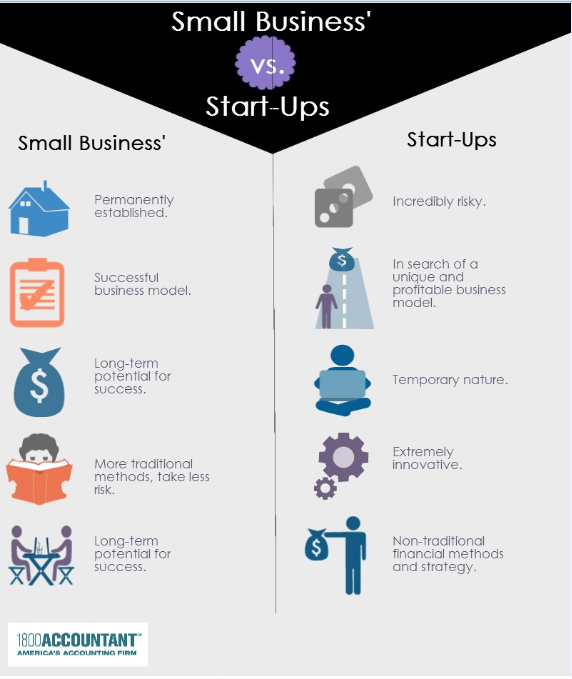Home > Startup > Creating a Plan >
A Small Business vs. a Startup: What’s the Difference?
By: 1800Accountant

Self-motivated entrepreneurs toss around a variety of words. Two of these highly popular terms include “small business” and “startup.” While they can refer to similar entrepreneurial endeavors in some cases, they are quite different from a broader perspective.
The Traditional Strategy & Stability of a Small Business
If you tell an artist to paint a picture of a small business, they might paint a mom-and-pop restaurant with a handful of employees. They might paint a consulting firm in which a husband handles the consulting work while his wife serves as his administrative assistant. Or, they might paint a small retail store in which its shelves are lined with handmade clothing items. As you can see, the result of this artist’s work would be a work of art representing an enterprise that has likely been put up in the past.
Under most circumstances, a small business is a permanently established organization that has developed or borrowed a successful business model with long-term potential for success. Small businesses tend to be more formally structured in terms of how they do business based on their past history or the history of other similar organizations. As such, they don’t take quite as many risks as their startup counterparts do. Small business owners like to rely on the hard work and persistence that have made achieving the American dream of self-employment a reality over time.
With more of a stable platform in place, small businesses are often designed to exist for many years to come. Their ownership might even be passed down from one generation to another, as long as they can sustain any economic or market struggles that arise over the course of time.
The Incredibly Innovative Yet Risky Nature of a Startup
Imagine the excitement of spinning the wheel on Wheel of Fortune, hoping that you’ll land on a big dollar amount and take home a nice haul in cash or prizes. While there is some luck to this, there’s also some strategy to how hard you spin the wheel in order to give yourself the best chance of hitting a big amount. On the other hand, you could land on “Bankrupt” and lose all the money you’ve racked up. This game show analogy of risk and reward is very applicable to the philosophy behind startup companies.
A basic definition of a startup is a temporary organization that is in search of a unique and profitable business model with hopes and dreams of making it big. Startups can be much more innovative and change direction on a dime. Because they are still seeking the most appropriate business practices, owners of startups can take chances by doing things that traditional small business owners would never consider doing. This could involve putting lots of money into an idea that could break your bank or make you rich, mainly because there is minimal history to it.
There is a common assumption that a startup is a brand new business in its infancy stages of the first few months or so. However, some startups have been around for years and are continuing to evolve. They may not be struggling financially and instead could be highly successful, but their owners are always looking for ways to gain an edge over the competition through innovative business practices and taking risks.
The technology field has long been known to include lots of startups since there are so many new and creative ideas out there on how to improve the world through technological development. Some entrepreneurs think they can be the next Steve Jobs or Bill Gates. But due to the saturated tech industry, there is so much competition out there for people to find the next big thing that will put millions in their pockets. The “.com” bust of the late 1990s and early 2000s is a perfect example of how a startup can take off for a short time and then fall toward bankruptcy in no time.

This article was originally published by 1800 Accountant
Published: May 22, 2014
7166 Views
7166 Views












